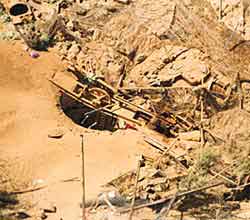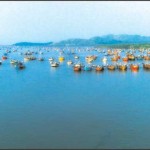Problems We Face
After the leaders of the US and USSR declared that a nuclear war cannot be won and should not be initiated in 1985 there have not been significant writings on nuclear strategic theology in the western world. Most of the writings thereafter have focused on arms control and non-proliferation. In India in spite of our agonizing over the ethics of going nuclear for the last three decades we failed to build up a critical mass of people knowledgeable in western nuclear strategic doctrines who can adapt them to the Indian context. Most of the academic expertise has been on western arms control theology since western funding agencies deliberately channeled their resources into that area. Others mostly studied the western strategic theology and an overwhelming majority accepted them lock, stock and barrel. Very few tried to think through independently and evolve a strategic doctrine suited to Indian needs.
Therefore when the nuclear tests were conducted there was a spate of pronouncements not noted for restraint and responsibility or for their understanding of the subject-matter. The government failed to give a lead presumably because of a dearth of adequate number of resource persons within. Our government does not have the culture of tapping knowledge and talent from outside. Nor do our political parties. Our media, both print and electronic, dripped with sanctimonious sentiment and hardly helped with relevant facts or knowledgeable comment. Many of our intellectuals quoted Gandhi without having studied him. Among the eight nuclear and undeclared nuclear weapon powers India stands alone in agonizing over its nuclearization and confounded by its ignorance. There is no attempt, among political parties, many of whose leaders nurtured the nuclear weapons programme to come together to evolve a consensus.
Every political leader thinks he has to enlighten the public with his uninformed comments on the nuclear issue. Every commentator feels obliged to register where he stands on the nuclear issue and most of them declare themselves to be on the side of virtue and against Indian nuclear weapons.
In almost all nuclear weapon powers, when the weapons were acquired most of the populations were not adequately informed about them. The depth of ignorance can be gauged from the fact that it took forty years from the dawn of the nuclear era for the strategists and political-military leaderships of the nuclear weapon powers to develop some understanding about the fightability of nuclear war. Even now if the people of those countries understood the true nature of nuclear weapons and their limitations they would not be paying their taxes to maintain such monstrous stockpiles. In that sense the inadequacy of knowledge in our country is not worse than what it is in the US, UK, France, Russia and China. However in those countries there is a consensus, however misguided it may have been, to support the nuclear weapon policy of their respective governments. In our country in spite of our policy being more rational there is no consensus and not even a concerted attempt at building a consensus. Reading the international media one gets the impression that there is perhaps greater understanding of the Indian position among foreign analysts than among sections of Indian analysts. The initiative to build the consensus must come from the government since it took this historic decision to make India a declared nuclear weapon state.
 The government needs to organize discussions and seminars for the parliamentarians, including ministers, and impress upon them that as a nuclear weapon state all our pronouncements should be extremely restrained and there must not be too many off-the-cuff remarks our politicians are generally fond of making, which our media takes a delight in printing. It will be very helpful if politicians of the ruling party discipline themselves not to talk about the nuclear issue and leave it to one or two better equipped leaders alone to deal with. There is a need for a crash course for our Foreign Service officers on international nuclear security and Indian nuclear security policy. The armed forces are generally aware of the western nuclear theology but they have to be given a reorientation to think through the issue in the Indian and Asian contexts and in the light of post-1985 developments when the leaders of the two superpowers came t6 the conclusion that a nuclear war was not fightable.
The government needs to organize discussions and seminars for the parliamentarians, including ministers, and impress upon them that as a nuclear weapon state all our pronouncements should be extremely restrained and there must not be too many off-the-cuff remarks our politicians are generally fond of making, which our media takes a delight in printing. It will be very helpful if politicians of the ruling party discipline themselves not to talk about the nuclear issue and leave it to one or two better equipped leaders alone to deal with. There is a need for a crash course for our Foreign Service officers on international nuclear security and Indian nuclear security policy. The armed forces are generally aware of the western nuclear theology but they have to be given a reorientation to think through the issue in the Indian and Asian contexts and in the light of post-1985 developments when the leaders of the two superpowers came t6 the conclusion that a nuclear war was not fightable.
There has to be rethinking about every aspect of our foreign policy. India will be dealing with Pakistan and China as a nuclear weapon power. India’s role in Asia will be as an active participant in an Asian balance of power. Our style and approach to nuclear disarmament need to be rethought though our goal continues to be the same. India needs to be sensitive to other Asian countries’ perceptions about our image as a nuclear weapon state and make extra efforts to build up confidence because, as Gandhi pointed out long ago, even friends fear nuclear weapon nations.
The Way Ahead
Already the dust has started settling down and the world is coming to terms with the Indian nuclear reality. The US, as was to be expected, is signalling that it will adapt itself to nuclear India and after a decent interval the US strategic planners will start exploring how to use this factor to further their national interests. China, too, will find it has no alternative. The sanctions imposed will be lifted gradually and things will get back to normal. To some extent the time taken for that will depend on our diplomacy. A realistic assessment of the international situation as it is likely to evolve will help a lot in formulating our own strategy.
There is no point in India demanding to be recognized as a nuclear weapon state and admitted to the NPT as such. That will neither be in our interest nor in consonance with our past principled denunciation of NPT as nuclear apartheid. India will conduct itself as a responsible nuclear weapon power. It is for other nuclear hegemonic powers to wrestle with the problems of fitting in India with a global nuclear regime. If we have to deal with the International Atomic Energy Agency we shall deal with it as other nuclear weapon powers do. In due course the others will have to accommodate India in the Nuclear Suppliers’ Club in their own interest. We can afford to wait. The NPT cannot easily be amended. In the year 2000 at the next NPT Review Conference they will have to face the post -Shakti nuclear realities. That will throw light on how realistic the nuclear hegemonic powers are and how the non-nuclear weapon powers take advantage of the new situation to press the nuclear powers to move towards nuclear disarmament. There are some signs that the non-nuclear weapon powers may have acquired some clout because of the Indian and Pakistani tests.
Our attitude towards the CTBT should be pragmatic and not doctrinaire. We have already made the point that India cannot be pressured to sign the CTBT. The US needs the CTBT more than India does. Therefore the US has to make it worthwhile for India to accede to the CTBT. There can be a lot of give-and-take in the style of doing it and packaging the deal to sell the transaction to the US legislators and to the Indian legislators and public opinion as well. That again calls for consensus building in India for which the initiative has to come from the government.
India should declare a no-first-use policy unilaterally and without any caveats. It will yield enormous diplomatic dividends and shift the burden of behaving with responsibility on to Pakistan. In fact India will be in a position to call Pakistani tactics on the Kashmir issue as nuclear blackmail. India should also propose an institutionalized negotiating process with Pakistan for nuclear risk reduction and war avoidance. Pakistan is bound to face enormous economic difficulties in the next few years. India can initiate a number of unilateral steps in regard to trade concessions which will be difficult for Pakistan to refuse. Since India and Pakistan are nuclear neighbours and are not friends it is imperative that the two countries should be in continuous communication at the highest levels, political, military and bureaucratic. When a border or line of control is under dispute in the nuclear age logic dictates that it should first be frozen on the basis of status quo. This is what happened between the West and the East during the Helsinki process in Europe. India should draw the attention of the US, UK, France and Russia to this aspect and urge them not to do or say anything which would encourage Pakistan to think that nuclear blackmail would bring in external intervention in Kashmir or internationalize the issue.
With China, India should offer to enter into a no-first-use agreement on the lines it has with Russia. It would put Chinese sincerity to test. China professes to support a no-first-use agreement among the nuclear weapon powers. If there can be a no- first-use agreement among the four Asian nuclear weapon powers that would go a long way in generating pressure on the three western powers too to join the no-first-use agreement. No-first-use agreement is the first step towards delegitimization of nuclear weapons. If China turns down India’s offer it will have an adverse impact on its credibility. As a nuclear weapon power India should be able to engage China in a meaningful dialogue on the future of Asian balance of power. Similarly, India would be able to pursue dialogues with the US, Russia, Japan and the ASEAN in language which is common currency in the international community-in a framework of balance of power. Unfortunately, most of our politicians, diplomats and academics do not realize that nonalignment was pursuit of balance of power in a bipolar world where the two adversaries were locked in perpetual hostility and still were unable to go to war because of nuclear weapons. In a polycentric world nonalignment of the bipolar era becomes balance of power.
| Editor’s Pick |
India playing an active role in the Asian and global balance of power should make India a more attractive destination for foreign investments. Our Foreign Office, Finance Ministry and Commerce Ministry will need to change their mind-sets and start devising ways and means of transforming political influence into economic interest as Deng Xiaoping did for China in the 1980s.
India was reborn on 11 May 1998. Both the histories of India and the world experienced some changes of direction on that day. The full import of it will be known only as the years unfold. The government and this country are yet to realize its full significance. It may well prove to be our second tryst with destiny.




